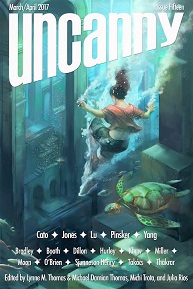“With Cardamom I’ll Bind Their Lips” by Beth Cato
Reviewed by Anne Crookshanks
Who’s to say that the dead can’t return? But, then how do you shut them up? In Beth Cato’s “With Cardamom I’ll Bind Their Lips,” all the men return from the meat-grinder of a war. One way or another. There’s no waiting to be notified by a detached official letter. The soldier himself, or at least his spirit, will return to his home, take a place, perhaps in the living room, and scream, shout, or murmur his last words, over and over again, reliving and sharing the horror. It’s up to magicians such as Lady Magdalena to seal their lips and make them otherwise bearable until they truly pass away.
Young Vera has a spiritual gift already. She can talk to animals, and they talk back to her. She wants to learn more with Lady Magdalena, but, more to the point, her mother needs her to work. In a city wracked by war, every little bit of money or food helps them survive another day. Her audition did go well—unfortunately, that was sealing the lips of her late Uncle Ivan.
Beth Cato has an extraordinary storytelling gift that brings characters and events vividly to life, while never losing the thread of the narrative and maintaining a sense of enchantment. I look forward to reading more from her.
Going backwards in time is now possible. Yes, there are rigid protocols to follow. The “naked chrononauts,” as they’ve been dubbed, will take steps to insure that they will in no way interfere with the past. That even the air they breathe is smothered out of them so no microbes can contaminate a more pristine time period. But what should the scientific community do with the technology now that they have it? Being logical, they request proposals. Should they discover the color of a dinosaur’s crest? Better to preserve the Dead Sea Scrolls? Our narrating scientist has something else in mind, and, as far as he is concerned, the fix is in. “Rising Star,” by Stephen Graham Jones, is a quick, clever story.
Singapore, 1942: Harry Lee Kuan is presented with a life or death situation. What he does will not only affect his life, but also the lives of the other men around him.
Harry Lee Kuan makes a choice. It’s the wrong choice. He is supposed to talk his way out of a Japanese firing squad, leaving the other, less gifted prisoners to their fate. But the fiftieth Harry Lee Kuan does not do that. Not this time. Not this simulation. Of course, every Harry Lee copy the Academy makes varies a little from the original. Running simulations of past events in the original’s life ensures that the clones’ buyers get exactly the qualities they’re paying for. It’s a matter of quality control, and the fiftieth Harry just failed that test. As a story about daring to be different to do the right thing, JY Yang‘s narrative in “Auspicium Melioris Aevi” works very well. It is just in the resolution, or lack thereof, that the readers are left hanging, though no doubt deliberately.
“If the lights go out, start counting Sarahs.”
As the title of Sarah Pinsker’s “And Then There Were (N-One)” implies, the story’s set-up has its similarities to Agatha Christie’s well-known work. On an independent resort island off the coast of Canada during a massive rainstorm, Sarah-con is being held, gathering hundreds of Sarah Pinskers from alternate timelines who are all just a tiny bit different from one another, depending on their divergence points. Some have it seemingly all together. Others let their grunge flags fly. Our point-of-view Sarah is seemingly relatively ordinary. In her timeline, she didn’t work as a brilliant scientist and discover how to contact and connect other worlds.
She is an insurance adjuster who lives happily with her beloved Mabel. There are many Sarahs attending who live happily with their Mabels, but only one is an insurance adjuster, the closest thing to a detective at Sarah-con, and, naturally, the one they call in when the body of a dead Sarah—a con organizer, no less—shows up in a public place. It’s a fairly straightforward murder mystery wrapped in an alternate worlds story, as claustrophobic as cons can be, and rather self-absorbed, for obvious reasons as the Sarahs ponder their lives’ possibilities.
Almost more of a poem than a story, S. Qiouyi Lu’s “An Abundance of Fish” is a very short piece on the mundane and fabulous disasters that can strike a happy household. Likely deliberately, no attempt is made to make sense of the major disaster or deal with it on any terms except emotional ones. The characters are reactive rather than active. Their lives together were pleasant, moored in each other, and Chinese traditions were a tie to the old world rather than something to be taken seriously. But in the midst of later loss, those same traditions, or superstitions as one character called them, bring real comfort and a link to a happier past.
 Uncanny #15, March/April 2017
Uncanny #15, March/April 2017